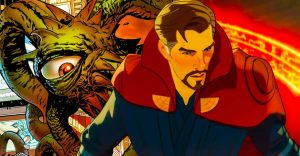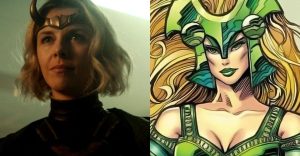Jojo Rabbit’s Ending Explained: How Jojo’s War Ends

Warning: SPOILERS ahead for Jojo Rabbit.
Taika Waititi’s anti-hate satire Jojo Rabbit takes on Nazis and an imaginary Adolf Hitler with plenty of laughs and a lot of heart – and despite the dark subject matter, it ends on a hopeful note. Following on from his debut in the Marvel cinematic universe, New Zealander director Taika Waititi decided to move in a completely different direction from the neon sci-fi epic of Thor: Ragnarok. Returning more to the smaller dramedies he made his name on, such as Boy and Hunt for the Wilderpeople, Waititi chose to adapt the little-known novel Caging Skies by Christine Leunens, which follows a young member of the Hitler Youth in Vienna during the reign of Adolf Hitler.
Of course, this being a Taika Waititi film, Jojo Rabbit is certainly not a conventional wartime drama. The Nazis here are absolute idiots, the one-liners fly thick and fast, and the protagonist, Johannes ‘Jojo’ Betzler (the acting debut of Roman Griffin Davis), receives worldly wisdom from his imaginary best friend Adolf Hitler, as played by Waititi himself. Jojo is gung-ho about the Nazi regime, as only a brainwashed ten-year-old can be, but his blind fanaticism is challenged when he discovers that his mother (as played by Scarlett Johansson) is protecting a young Jewish girl called Elsa (Thomasin McKenzie) by hiding her in their attic.
Jojo Rabbit made its world premiere at this year’s Toronto International Film Festival, where it managed to take home the Grolsch People’s Choice Award, beating off tough competition from the likes of Parasite, Joker, and Knives Out. With Jojo Rabbit now in theaters worldwide, let’s break down the movie’s ending – and what it means.
How Jojo Rabbit Works as an Anti-Hate Satire

Waititi hasn’t been shy in focusing on how the movie is what he calls an “anti-hate satire.” Indeed, it’s on all the posters, almost as a mission statement (and possibly a sad reminder at a time when it seems Nazis have unironically come back in fashion). Jojo Rabbit’s most effective weapon is its humor, and how it uses that to expose the flimsiness of propaganda.
Jojo imagines a version of Hitler that is somewhat accurate to the overblown deified image of him created by the Nazi Party, but twisted to fit the mind of a pre-teen boy. His imaginary BFF take on Adolf is much goofier but near mystical in his abilities, which wasn’t far off how propaganda portrayed him (this one even eats unicorn meat). He’s also played by a Jewish Maori actor, which only further emphasizes the joke. The version of Nazi life Jojo lives seems so care-free and delightful in the way playtime is, because it all seems so unserious and separate from the true devastation by war. The “exercises” of the Hitler Youth are stupid, but the sort of thing that would seem amazing at the age of ten: from setting things on fire to casually throwing knives at trees to dressing like a robot to collect scrap metal.
Some critics said the reason the film didn’t work for them because it was too carefree in these moments, but this is how a child raised in the smothering grip of propaganda would see the world if they were taught to believe that they were part of the chosen people and their leader was essentially god on earth. Jojo doesn’t see that there’s no real glory in war, or that the adults left in charge are either anti-Nazi rebels like his mother or incompetent dolts like Sam Rockwell and Rebel Wilson’s characters. It’s only when Jojo finds Elsa in his attic and she ruthlessly takes down every piece of anti-Semitic nonsense he’s been fed by the party that reality hits in. The film’s color palette changes and the world seems a lot grimmer for Jojo. Food runs dry, morale depletes, and in the film’s most heartbreaking moment, Jojo discovers that his mother has been hung after being revealed to be a political dissident. Everything Jojo believed in stops being fun and games when the magnitude of the Nazi regime’s cruelty impacts him directly.
How Does Jojo Rabbit End?

As the war reaches its end, the Nazi Party desperately try to retain power as the American army draws ever nearer. The Gestapo, led by Captain Deertz (Stephen Merchant, essentially playing Major Toht in Raiders of the Lost Ark), arrive at Jojo’s home and tear it apart, looking for evidence of wrongdoing. Elsa reveals herself, pretending to be Jojo’s late sister. When the Gestapo demands her papers, she hands them over to Captain Klenzendorf (Sam Rockwell), who confirms her date of birth. After they leave, she reveals that she got the date wrong, meaning that Klezendorf chose to let them go. For Jojo, it’s a real moment of realization: He’s been taught his whole life that Jews are monstrous in appearance and attitude, making them easy to spot in a crowd, but nobody knew Elsa was Jewish when they saw her in his house.
In the city, the Americans have arrived and the remaining dregs of Nazi soldiers have suited up children to help them fight a pointless battle. Jojo is put in a Nazi coat and told to start shooting, but he chooses to run and avoid death. It doesn’t take long for the Allied troops to win and Jojo, along with other uniformed Nazis, is rounded up to be executed. Klezendorf takes off Jojo’s coat and yells performatively at him, calling him a Jew until the American soldiers remove him and have Klezendorf dragged off to be shot.
Jojo heads home and, worried that Elsa will leave him now that the war is gone, says that the Nazis won. Writing a letter to her in the persona of her boyfriend – an occasionally passive-aggressive treat Jojo has offered Elsa since meeting her – he says he has a way to smuggle her out of the house. For one last time, Jojo’s imaginary Hitler appears. He’s far less humorous now and fully shows himself as a monster. Jojo realizes he has no need for him and rejects him with a kick out of the window. Jojo takes Elsa outside, where it’s revealed that the Allies did indeed win. She slaps Jojo for tricking her and then, free and alone together with no idea what the future holds, they dance.
What Jojo & Elsa’s Dance To German Heroes Means

Jojo and Elsa dance to “Heroes” by David Bowie, one of the musician’s most iconic songs. The 1977 hit was part of Bowie’s Berlin period after he took up residence in West Berlin and began experimenting with krautrock and electro music. The song was so beloved that the German Foreign Office paid homage to Bowie for “helping to bring down the wall” after his death in 2016. In Jojo Rabbit, the version the pair dance to is in German, as is the version of The Beatles’s “I Wanna Hold Your Hand” in the opening credits.
The use of anachronistic pop music l ends the film a level of out-of-time modernity that fits its aesthetic and Waititi’s humor, but the dancing itself is the climax to a hard-won battle for Jojo and Elsa. Jojo’s mother frequently preached the joys of dancing and living life joyously, even when everything seems irredeemably dark. This is something Jojo, while still deeply entrenched in blind loyalty to the Nazis, never saw as a necessary part of his childhood. After the war has ended, neither Jojo nor Elsa have much left in the world following the deaths of their respective families. In an uncertain future, all they can do is dance.
- Jojo Rabbit (2019)Release date: Oct 18, 2019
About The Author


















